精品初中英语虚拟语气讲解及练习
初中英语虚拟语气的技巧及练习题及练习题(含答案)
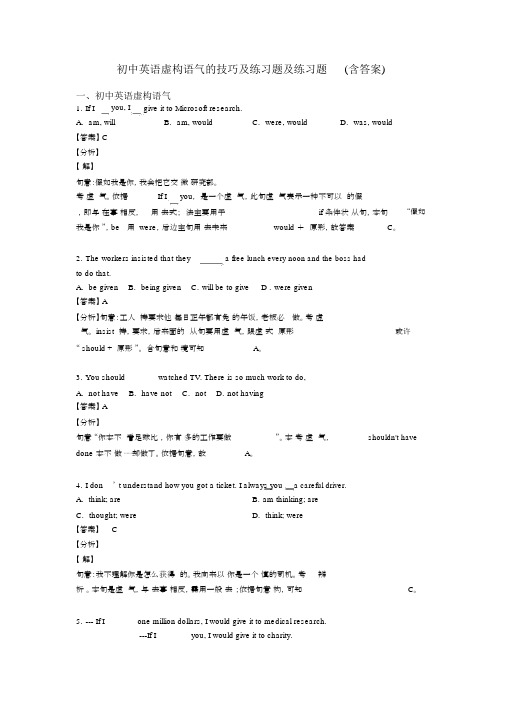
初中英语虚构语气的技巧及练习题及练习题(含答案)一、初中英语虚构语气1.If I you, I give it to Microsoft research.A. am, will【答案】 CB. am, would C. were, would D. was, would【分析】【解】句意:假如我是你,我会把它交微研究部。
考虚气。
依据If I you,是一个虚气,此句虚气表示一种不可以的假,即与在事相反,用去式;法主要用于if 条件状从句,本句我是你”,be 用 were,后边主句用去未来would +原形,故答案C。
“假如2.The workers insisted that they a free lunch every noon and the boss hadto do that.A. be given B. being given C.will be to give D .were given【答案】 A【分析】句意:工人持要求他每日正午都有免的午饭,老板必做。
考虚气。
insist 持,要求,后来面的从句要用虚气,跟虚式原形“ should + 原形”。
合句意和境可知A。
或许3.You should_______ watched TV. There is so much work to do,A. not have B. have not C. not D.not having【答案】 A【分析】句意“你本不看足球比,你有多的工作要做”。
本考虚气,shouldn't have done 本不做⋯⋯却做了。
依据句意,故A。
4.I don’ t understand how you got a ticket. I always you a careful driver.A. think; are C. thought; were B.am thinking; are D. think; were【答案】【分析】【解】C句意:我不理解你是怎么获得的。
初中必备英语虚拟语气技巧全解及练习题(含答案)
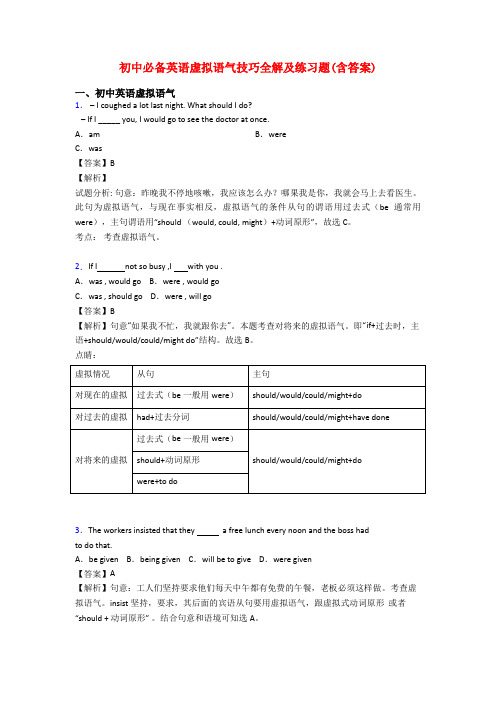
初中必备英语虚拟语气技巧全解及练习题(含答案)一、初中英语虚拟语气1.– I coughed a lot last night. What should I do?– If I _____ you, I would go to see the doctor at once.A.am B.wereC.was【答案】B【解析】试题分析: 句意:昨晚我不停地咳嗽,我应该怎么办?哪果我是你,我就会马上去看医生。
此句为虚拟语气,与现在事实相反,虚拟语气的条件从句的谓语用过去式(be通常用were),主句谓语用“should (would, could, might)+动词原形”,故选C。
考点:考查虚拟语气。
2.If I not so busy ,I with you .A.was , would go B.were , would goC.was , should go D.were , will go【答案】B【解析】句意“如果我不忙,我就跟你去”。
本题考查对将来的虚拟语气。
即“if+过去时,主语+should/would/could/might do”结构。
故选B。
点睛:3.The workers insisted that they a free lunch every noon and the boss hadto do that.A.be given B.being given C.will be to give D.were given【答案】A【解析】句意:工人们坚持要求他们每天中午都有免费的午餐,老板必须这样做。
考查虚拟语气。
insist坚持,要求,其后面的宾语从句要用虚拟语气,跟虚拟式动词原形或者“should + 动词原形” 。
结合句意和语境可知选A。
4.--- If I_______ one million dollars, I would give it to medical research.---If I _______ you, I would give it to charity.A.will have, am B.would have, was C.had, were D.have, is【答案】C【解析】考察虚拟语气。
中考英语虚拟语气基础练习题40题带答案解析
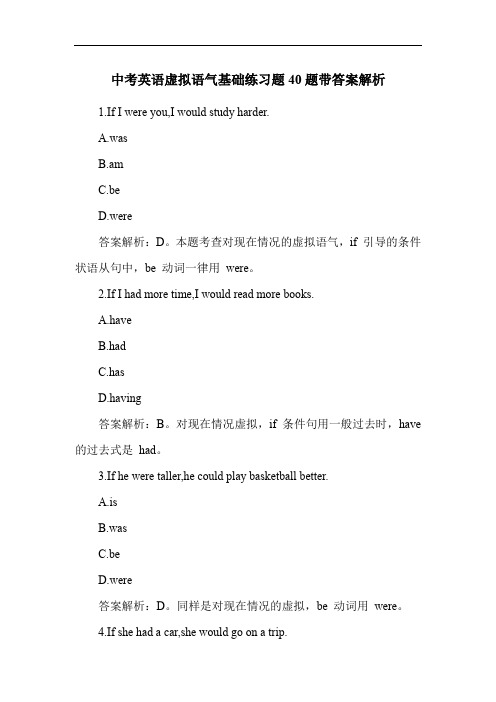
中考英语虚拟语气基础练习题40题带答案解析1.If I were you,I would study harder.A.wasB.amC.beD.were答案解析:D。
本题考查对现在情况的虚拟语气,if 引导的条件状语从句中,be 动词一律用were。
2.If I had more time,I would read more books.A.haveB.hadC.hasD.having答案解析:B。
对现在情况虚拟,if 条件句用一般过去时,have 的过去式是had。
3.If he were taller,he could play basketball better.A.isB.wasC.beD.were答案解析:D。
同样是对现在情况的虚拟,be 动词用were。
4.If she had a car,she would go on a trip.A.hasB.hadC.haveD.having答案解析:B。
条件句对现在虚拟,用一般过去时,had 是have 的过去式。
5.If we had enough money,we would buy a new house.A.haveB.hadC.hasD.having答案解析:B。
对现在情况虚拟,have 的过去式had。
6.If I were a bird,I could fly in the sky.A.wasB.amC.beD.were答案解析:D。
对现在虚拟,be 动词用were。
7.If he had free time,he would watch movies.A.hasB.hadC.haveD.having答案解析:B。
条件句对现在虚拟,用had。
8.If she were a singer,she would sing beautiful songs.A.isB.wasC.beD.were答案解析:D。
对现在情况虚拟,be 动词用were。
中考英语虚拟语气辨析练习题20题含答案解析
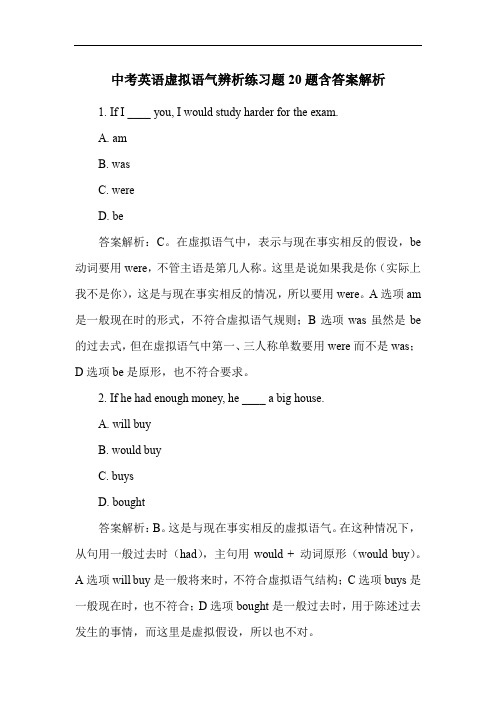
中考英语虚拟语气辨析练习题20题含答案解析1. If I ____ you, I would study harder for the exam.A. amB. wasC. wereD. be答案解析:C。
在虚拟语气中,表示与现在事实相反的假设,be 动词要用were,不管主语是第几人称。
这里是说如果我是你( 实际上我不是你),这是与现在事实相反的情况,所以要用were。
A选项am 是一般现在时的形式,不符合虚拟语气规则;B选项was虽然是be 的过去式,但在虚拟语气中第一、三人称单数要用were而不是was;D选项be是原形,也不符合要求。
2. If he had enough money, he ____ a big house.A. will buyB. would buyC. buysD. bought答案解析:B。
这是与现在事实相反的虚拟语气。
在这种情况下,从句用一般过去时 had),主句用would + 动词原形 would buy)。
A选项will buy是一般将来时,不符合虚拟语气结构;C选项buys是一般现在时,也不符合;D选项bought是一般过去时,用于陈述过去发生的事情,而这里是虚拟假设,所以也不对。
3. If they ____ here tomorrow, we would be very happy.A. comeB. comesC. cameD. will come答案解析:C。
这是与将来事实相反的虚拟语气。
在这种情况下,从句可以用一般过去时 came),表示对将来的一种虚拟假设。
A选项come是一般现在时,不符合虚拟语气结构;B选项comes是一般现在时的第三人称单数形式,同样不符合;D选项will come是一般将来时,也不符合这种虚拟语气的用法。
4. If she ____ more carefully yesterday, she wouldn't have made so many mistakes.A. workedB. worksC. had workedD. has worked答案解析:C。
中考英语虚拟语气运用练习题30题含答案解析
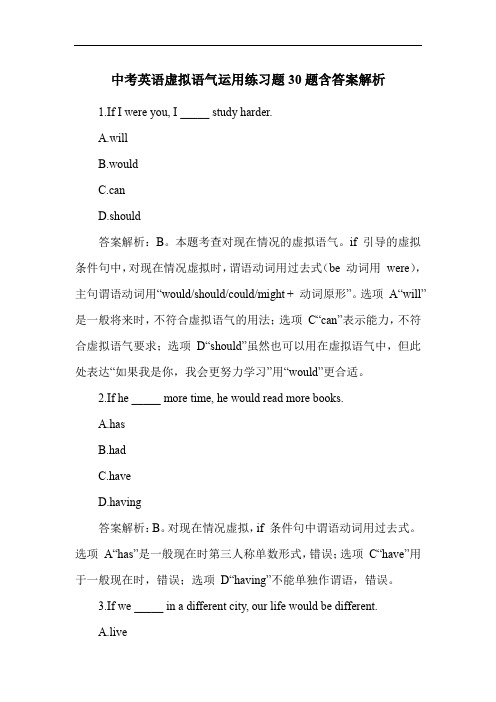
中考英语虚拟语气运用练习题30题含答案解析1.If I were you, I _____ study harder.A.willB.wouldC.canD.should答案解析:B。
本题考查对现在情况的虚拟语气。
if 引导的虚拟条件句中,对现在情况虚拟时,谓语动词用过去式(be 动词用were),主句谓语动词用“would/should/could/might + 动词原形”。
选项A“will”是一般将来时,不符合虚拟语气的用法;选项C“can”表示能力,不符合虚拟语气要求;选项D“should”虽然也可以用在虚拟语气中,但此处表达“如果我是你,我会更努力学习”用“would”更合适。
2.If he _____ more time, he would read more books.A.hasB.hadC.haveD.having答案解析:B。
对现在情况虚拟,if 条件句中谓语动词用过去式。
选项A“has”是一般现在时第三人称单数形式,错误;选项C“have”用于一般现在时,错误;选项D“having”不能单独作谓语,错误。
3.If we _____ in a different city, our life would be different.A.liveB.livedC.will liveD.would live答案解析:B。
对现在情况虚拟,条件句谓语动词用过去式。
选项A“live”是一般现在时,错误;选项C“will live”是一般将来时,错误;选项D“would live”是对过去情况虚拟时主句的形式,错误。
4.If she _____ taller, she could play basketball better.A.isB.wasC.wereD.be答案解析:C。
对现在情况虚拟,be 动词用were。
选项A“is”是一般现在时,错误;选项B“was”一般过去时,且在虚拟语气中只用于主语是I/he/she/it 的情况下,此处主语是she,应该用were;选项D“be”不能单独作谓语,错误。
初中虚拟语气(清晰版)
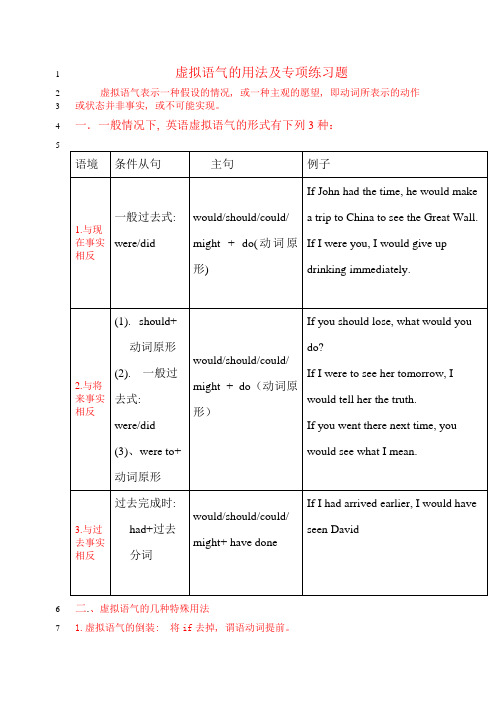
虚拟语气的用法及专项练习题1虚拟语气表示一种假设的情况, 或一种主观的愿望, 即动词所表示的动作2或状态并非事实, 或不可能实现。
3一.一般情况下, 英语虚拟语气的形式有下列3种:45二.、虚拟语气的几种特殊用法61.虚拟语气的倒装: 将if去掉, 谓语动词提前。
7●如:8I..wer.you..woul.giv.u.drinking.=Wer..you..woul.giv.u.drinking.9●I..ha.arrive.earlier..woul.hav.see.David..Ha..arrive.earlier..woul.hav.se10e.David.112. 有时条件从句中的动作和主句中的动作发生的时间不一致, 如:12If he had followed the doctor’s advice, he would be quite all right now.13(if从句是对过去的虚拟, 主句是对现在的虚拟。
)14If I were you, I would have gone home.15(if从句是对现在的虚拟, 主句是对过去的虚拟。
)1617注意: 在此结构中that不可省略;should省不省均可。
18He suggested that they (should ) stop smoking.19上述动词的名词形式出现时, that 引导的从句仍用虚拟语气。
20He made a request that they (should ) stop smoking.21注意:22* insist有两个意思, 当表示“坚持让某人做某事”(含命令口吻)时, 23that从句用虚拟, 如: He insists that we (should) go home now.24当表示“坚持某种说法”时, that从句用陈述语气。
25He insists that he is right.2627It is important that you (should) follow the doctor’s o rders.28It is right that you should have done your homework.29注意: wish与hope接宾语从句的区别在于: hope表示一般可以实现的30希望, 宾语从句用陈述语气。
初三英语虚拟语气(三)练习题30题含答案解析
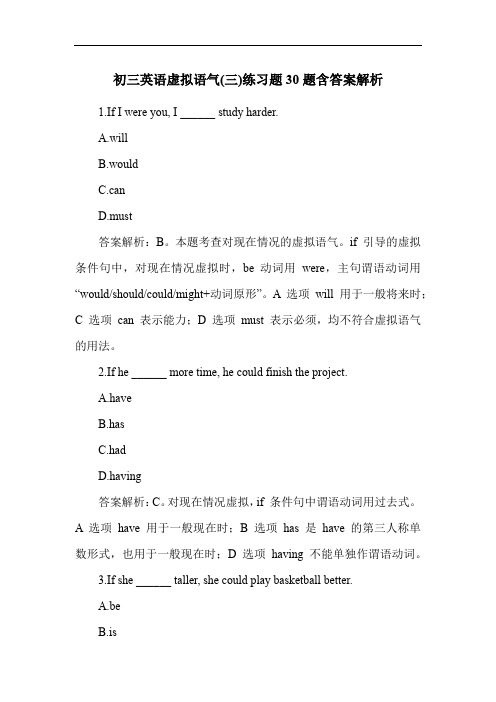
初三英语虚拟语气(三)练习题30题含答案解析1.If I were you, I ______ study harder.A.willB.wouldC.canD.must答案解析:B。
本题考查对现在情况的虚拟语气。
if 引导的虚拟条件句中,对现在情况虚拟时,be 动词用were,主句谓语动词用“would/should/could/might+动词原形”。
A 选项will 用于一般将来时;C 选项can 表示能力;D 选项must 表示必须,均不符合虚拟语气的用法。
2.If he ______ more time, he could finish the project.A.haveB.hasC.hadD.having答案解析:C。
对现在情况虚拟,if 条件句中谓语动词用过去式。
A 选项have 用于一般现在时;B 选项has 是have 的第三人称单数形式,也用于一般现在时;D 选项having 不能单独作谓语动词。
3.If she ______ taller, she could play basketball better.A.beB.isD.was答案解析:C。
对现在情况虚拟,be 动词用were。
A 选项be 动词原形不能单独使用;B 选项is 用于一般现在时;D 选项was 用于一般过去时。
4.If we ______ a magic wand, we could solve all problems.A.haveB.hasC.hadD.having答案解析:C。
对现在情况虚拟,if 条件句中谓语动词用过去式。
A、B 选项分别用于一般现在时,D 选项having 不能单独作谓语动词。
5.If they ______ enough money, they would travel around the world.A.haveB.hasC.hadD.having答案解析:C。
对现在情况虚拟,if 条件句中谓语动词用过去式。
中考英语虚拟语气辨析练习题30题含答案解析
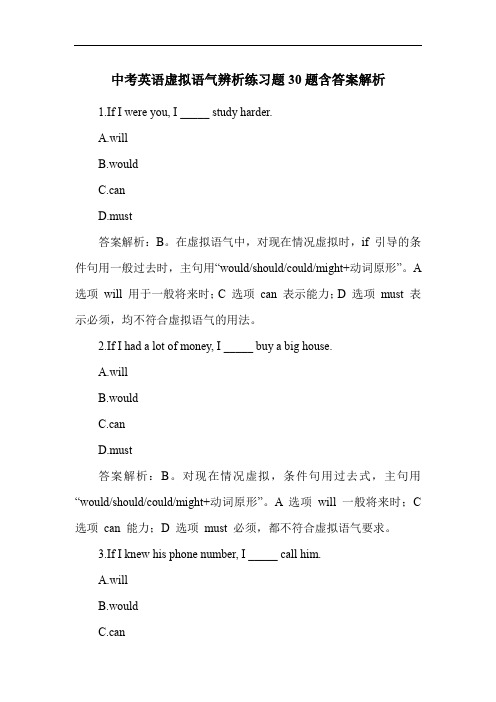
中考英语虚拟语气辨析练习题30题含答案解析1.If I were you, I _____ study harder.A.willB.wouldC.canD.must答案解析:B。
在虚拟语气中,对现在情况虚拟时,if 引导的条件句用一般过去时,主句用“would/should/could/might+动词原形”。
A 选项will 用于一般将来时;C 选项can 表示能力;D 选项must 表示必须,均不符合虚拟语气的用法。
2.If I had a lot of money, I _____ buy a big house.A.willB.wouldC.canD.must答案解析:B。
对现在情况虚拟,条件句用过去式,主句用“would/should/could/might+动词原形”。
A 选项will 一般将来时;C 选项can 能力;D 选项must 必须,都不符合虚拟语气要求。
3.If I knew his phone number, I _____ call him.A.willB.wouldC.can答案解析:B。
对现在情况虚拟,条件句用过去式,主句用“would/should/could/might+动词原形”。
A 选项will 将来时;C 选项can 能;D 选项must 必须,都不对。
4.If I were taller, I _____ play basketball better.A.willB.wouldC.canD.must答案解析:B。
对现在情况虚拟,条件句用were,主句用“would/should/could/might+动词原形”。
A 选项will 将来时;C 选项can 能够;D 选项must 必须,不符合要求。
5.If I had more free time, I _____ read more books.A.willB.wouldC.canD.must答案解析:B。
中考英语虚拟语气辨析练习题30题(带答案)
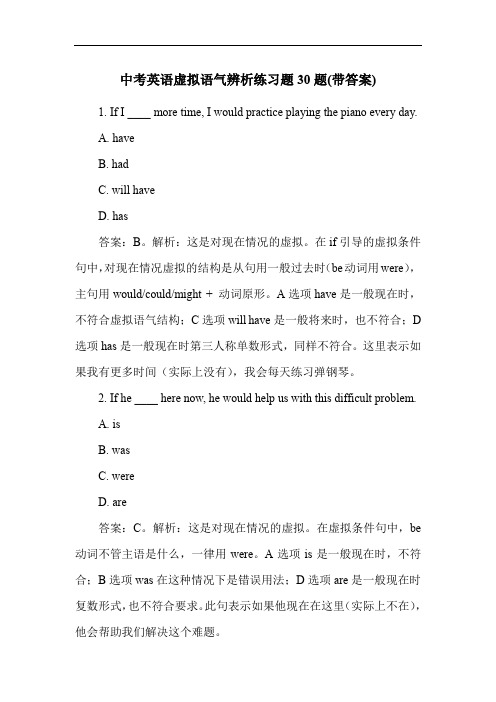
中考英语虚拟语气辨析练习题30题(带答案)1. If I ____ more time, I would practice playing the piano every day.A. haveB. hadC. will haveD. has答案:B。
解析:这是对现在情况的虚拟。
在if引导的虚拟条件句中,对现在情况虚拟的结构是从句用一般过去时(be动词用were),主句用would/could/might + 动词原形。
A选项have是一般现在时,不符合虚拟语气结构;C选项will have是一般将来时,也不符合;D 选项has是一般现在时第三人称单数形式,同样不符合。
这里表示如果我有更多时间 实际上没有),我会每天练习弹钢琴。
2. If he ____ here now, he would help us with this difficult problem.A. isB. wasC. wereD. are答案:C。
解析:这是对现在情况的虚拟。
在虚拟条件句中,be 动词不管主语是什么,一律用were。
A选项is是一般现在时,不符合;B选项was在这种情况下是错误用法;D选项are是一般现在时复数形式,也不符合要求。
此句表示如果他现在在这里( 实际上不在),他会帮助我们解决这个难题。
3. If she had studied harder last term, she ____ better grades.A. getsB. gotC. would getD. would have got答案:D。
解析:这是对过去情况的虚拟。
对过去情况虚拟的结构是从句用过去完成时,主句用would/could/might+have+过去分词。
A选项gets是一般现在时;B选项got是一般过去时;C选项would get是对现在或将来情况虚拟的主句形式,都不符合。
这里说如果她上学期学习更努力 实际上没有),她就会取得更好的成绩。
初二英语虚拟语气用法练习题30题含答案解析

初二英语虚拟语气用法练习题30题含答案解析1.If I were you, I ______ study harder.A.willB.wouldC.shallD.should答案解析:B。
本题考查与现在事实相反的虚拟语气。
在这种情况下,主句谓语动词用“would+动词原形”。
A 选项will 用于一般将来时,不是虚拟语气的用法;C 选项shall 通常用于第一人称,表示将来或征求意见等,此处不合适;D 选项should 通常表示应该,不符合虚拟语气的用法。
2.If he had time, he ______ play basketball with us.A.willB.wouldC.canD.could答案解析:B。
与现在事实相反的虚拟语气,主句谓语动词用“would+动词原形”。
A 选项will 不是虚拟语气用法;C 选项can 表示能力或可能性,不是虚拟语气;D 选项could 可以表示能力或可能性,也不是虚拟语气中与现在事实相反的正确用法。
3.If my sister were taller, she ______ be in the school basketball team.A.willB.wouldC.canD.must答案解析:B。
考查与现在事实相反的虚拟语气,主句用“would+动词原形”。
A 选项will 错误;C 选项can 不是虚拟语气用法;D 选项must 表示必须,不符合虚拟语气要求。
4.If I had a magic pen, I ______ draw beautiful pictures.A.willB.wouldC.canD.may答案解析:B。
与现在事实相反的虚拟语气,主句谓语动词用“would+动词原形”。
A 选项will 不对;C 选项can 不是虚拟语气用法;D 选项may 表示可能,也不是虚拟语气正确用法。
5.If my parents were rich, we ______ travel around the world.A.willB.wouldC.canD.should答案解析:B。
英语虚拟语气(一)解题方法和技巧及练习题及解析
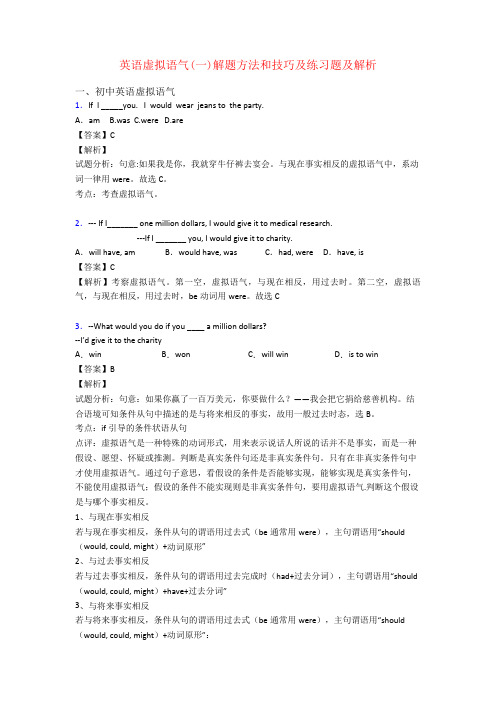
一般过去时,主句中用 would+动词的原形。故选 D。
考点:考查虚拟语气。
30.I’ m so busy. If I time, I travel around. A.have; would B.have; could C.had; would D.had; will 【答案】C 【解析】 试题分析:虚拟语气是一种特殊的动词形式,用来表示说话人所说的话并不是事实,而是
25.If I you, I’d keep quiet and listen carefully in class.
A.am
B.will be
C.were
【答案】C
【解析】
试题分析: 与现在事实相反:条件从句用动词过去式,主句用 would/could/should/might+
动 词 原 形 ; 与 过 去 事 实 相 反 : 条 件 从 句 用 had done , 主 句 用
考点:考查虚拟语气。
28.If I a boss, I would manage a big factory. A.are B.was C.were D.be 【答案】C 【解析】 试题分析:句意:如果我是老板,我会经营一家大型工厂。由句意可知,此句是虚拟语 气,if 引导的从句应该用过去式的形式,其中第一人称用 were,故答案为 C。 考点:考查虚拟语气。
假设、愿望、怀疑或推测。判断是真实条件句还是非真实条件句。只有在非真实条件句中
才使用虚拟语气。通过句子意思,看假设的条件是否能够实现,能够实现是真实条件句,
不能使用虚拟语气;假设的条件不能实现则是非真实条件句,要用虚拟语气.判断这个假设
是与哪个事实相反。
1、与现在事实相反
若与现在事实相反,条件从句的谓语用过去式(be 通常用 were),主句谓语用“should
初中虚拟语气讲解及专项练习与答案(带解析)
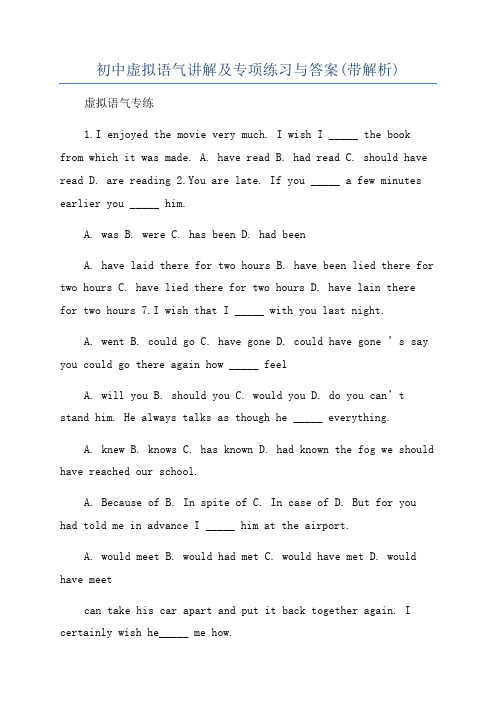
初中虚拟语气讲解及专项练习与答案(带解析)虚拟语气专练1.I enjoyed the movie very much. I wish I _____ the book from which it was made. A. have read B. had read C. should have read D. are reading2.You are late. If you _____ a few minutes earlier you _____ him.A. wasB. wereC. has beenD. had beenA. have laid there for two hoursB. have been lied there for two hoursC. have lied there for two hoursD. have lain therefor two hours 7.I wish that I _____ with you last night.A. wentB. could goC. have goneD. could have gone ’s say you could go there again how _____ feelA. will youB. should youC. would youD. do you can’t stand him. He always talks as though he _____ everything.A. knewB. knowsC. has knownD. had known the fog we should have reached our school.A. Because ofB. In spite ofC. In case ofD. But for you had told me in advance I _____ him at the airport.A. would meetB. would had metC. would have metD. would have meetcan take his car apart and put it back together again. I certainly wish he_____ me how.A. teachesB. will teachC. has taughtD. would teachwould have told him the answer had it been possible but I_____ so busy then.A. had beenB. wereC. wasD. would be ’s working hard for fear that he _____.A. should fall behindB. fell behindC. may fall behindD. would fallen behind 15.If it _____ another ten minutes the game would have been called off.A. had rainedB. would have rainedC. have seenD. rained suggested that they _____ use a trick instead of fighting.A. ShouldB. wouldC. doD. hadfather did not go to New York the doctor suggested that he _____ there.A. had hadB. have hadC. hadD. would have had you rather I _____ buying a new bikeA. decided againstB. will decide againstC. have decidedD. shall decide againstA. go to sleepB. went to sleepC. go to bedD. went to bed21.—Why didn’t you buy a new car —I would have bought one if I _____ enough money.A. hadB. have hadC. would haveD. had had she could sew _____.A. she make a dressB. she would have made a shirtC. she will make a shirtD. she would had made a coat today he would get there by Friday.A. Would he leaveB. Was he leavingC. Were he to leaveD. If he leaves doctor suggested that he _____ a short trip abroad.A. will takeB. would takeC. takeD. tookBakers arrived las t night. If they’d only let us know earlier_____ at the station.A. we’d meet themB. we’ll meet themC. we’d have met themD. we’ve met themI _____ you I _____ more attention to English idioms and phrases.A. was shall payB. am will payC. would be would payD. were would pay might have failed if you _____ us a helping hand.A. have not givenB. would not giveC. had not givenD. did not give law requires that everyone _____ his car checked at least once a year.A. hasB. hadC. haveD. will have is strange that he _____ so.A. would sayB. would speakC. should sayD. will speak I known her name _____A. or does she know mineB. and where does she liveC. she would be beautiful.D. I would have invited her to lunch. 31.He has just arrived but he talks as if he _____ all about that. A. know B. knows C. known D. knew32.If I _____ the money I would have bought a much bigger car.A. possessedB. ownedC. hadD. had had33.He was very busy yesterday otherwise he _____ to the meeting.librarian insists that John _____ no more books from the library before he returns all the books he has borrowed.A. will takeB. tookC. takeD. takes35.I left very early last night but I wish I _____ so early.A. hadB. didn’t haveC. had hadD. havewish that you _____ suc h a bad headache because I’m sure that you would have enjoyed the concert.A. hadn’tB. didn’t have hadC. hadn’t hadD. hadn’t have insisted that we all _____ in his office at one o’clock.A. beB. to beC. would beD. shall becouldn’t go to France after all. That’s too bad. I’m sure she would have enjoyed it if _____.A. she’s goneB. she’ll goC. she’d goneD. she’d gomust go there earlier. John has suggested that I _____ an hour before the discussion begins.A. goB. shall goC. will goD. would go英语虚拟语气讲解语气 (mood) 是一种动词形式,用以表示说话者的意图或态度。
虚拟语气详细讲解及经典习题 附答案
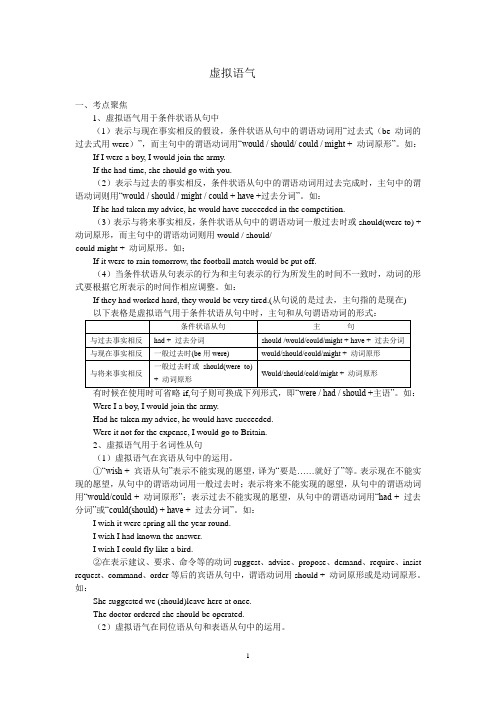
虚拟语气一、考点聚焦1、虚拟语气用于条件状语从句中(1)表示与现在事实相反的假设,条件状语从句中的谓语动词用“过去式(be动词的过去式用were)”,而主句中的谓语动词用“would / should/ could / might + 动词原形”。
如:If I were a boy, I would join the army.If the had time, she should go with you.(2)表示与过去的事实相反,条件状语从句中的谓语动词用过去完成时,主句中的谓语动词则用“would / should / might / could + have +过去分词”。
如:If he had taken my advice, he would have succeeded in the competition.(3)表示与将来事实相反,条件状语从句中的谓语动词一般过去时或should(were to) + 动词原形,而主句中的谓语动词则用would / should/could might + 动词原形。
如;If it were to rain tomorrow, the football match would be put off.(4)当条件状语从句表示的行为和主句表示的行为所发生的时间不一致时,动词的形式要根据它所表示的时间作相应调整。
如:If they had worked hard, they would be very tired.(从句说的是过去,主句指的是现在)Were I a boy, I would join the army.Had he taken my advice, he would have succeeded.Were it not for the expense, I would go to Britain.2、虚拟语气用于名词性从句(1)虚拟语气在宾语从句中的运用。
(完整版)虚拟语气讲解及练习题(含答案和解释)

(完整版)虚拟语气讲解及练习题(含答案和解释)虚拟语气讲解与练习黄志刚2013.10.一. 简介虚拟语气用来表示说话人的主观愿望或假想,而不表示客观存在的事实,所说的是一个条件,不一定是事实,或与事实相反。
虚拟语气通过谓语动词的特殊形式来表示。
英语中的语气分为陈述语气、祈使语气、虚拟语气在什么情况下用虚拟语气? 在表示虚假的、与事实相反的或难以实现的情况时用虚拟语气,表示主观愿望或表示某种强烈情感时,也用虚拟语气。
即当一个人说话时欲强调其所说的话是基于自己的主观想法,而不是根据客观实际,就用虚拟语气。
二. 虚拟语气在非真实条件状语从句中的用法1、真实条件状语从句与非真实条件状语从句真:eg . If he doesn’t hurry up, he will miss the bus. 如果他不快点,他将错过巴士。
( 真实条件状语)(不是虚拟语气)If he is free, he will ask me to tell stories. 如果他是空闲的,他会要求我讲故事。
(真实条件状语)(不是虚拟语气)非真:eg. If I were you, I would go at once.如果我是你,我马上就会去。
(非真实条件状语从句)If there were no air, people would die. 如果没有空气,人就会死亡。
(非真实条件状语从句)2、用法及动词形式1、表示与现在事实相反的情况,例1.If I were you, I would take an umbrella.如果我是你,我会带把伞。
(事实:我不可能是你) 2.If I knew his telephone number, I would tell you. 如果我知道他的电话号码,我就会告诉你。
(事实:不知道) 3.If there were no air orwater, there would be no living things on the earth. 如果没有水和空气,地球上就不会有生物。
初中虚拟语气讲解及专项练习与答案(带解析)
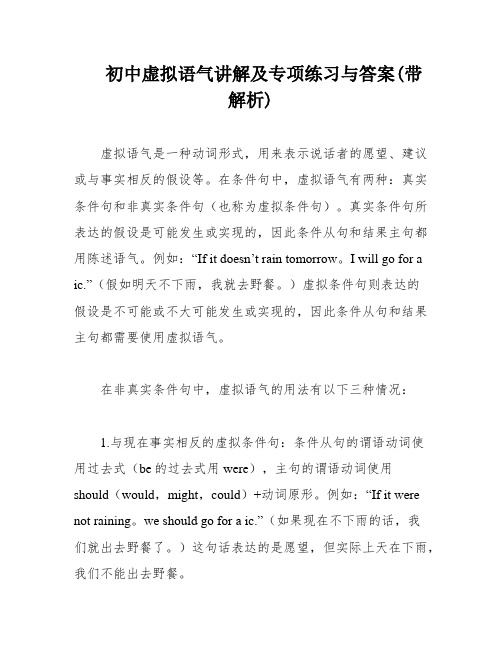
初中虚拟语气讲解及专项练习与答案(带解析)虚拟语气是一种动词形式,用来表示说话者的愿望、建议或与事实相反的假设等。
在条件句中,虚拟语气有两种:真实条件句和非真实条件句(也称为虚拟条件句)。
真实条件句所表达的假设是可能发生或实现的,因此条件从句和结果主句都用陈述语气。
例如:“If it doesn’t rain tomorrow。
I will go for a ic.”(假如明天不下雨,我就去野餐。
)虚拟条件句则表达的假设是不可能或不大可能发生或实现的,因此条件从句和结果主句都需要使用虚拟语气。
在非真实条件句中,虚拟语气的用法有以下三种情况:1.与现在事实相反的虚拟条件句:条件从句的谓语动词使用过去式(be的过去式用were),主句的谓语动词使用should(would,might,could)+动词原形。
例如:“If it were not raining。
we should go for a ic.”(如果现在不下雨的话,我们就出去野餐了。
)这句话表达的是愿望,但实际上天在下雨,我们不能出去野餐。
2.与过去事实相反的虚拟条件句:条件从句的谓语动词使用had+过去分词,主句的谓语动词使用should(would,might,could)+have+过去分词。
例如:“If he had come here。
he might have been able to help you.”(如果他来过这里,他或许能够帮助你。
)这句话表达的是对过去事实的假设,但实际上他没有来这里,他也没有帮助你。
3.与将来事实可能相反的虚拟条件句:条件从句的谓语动词可以使用动词过去式(be的过去式用were)、should+动词原形或were to+动词原形,主句的谓语动词使用should (would,might,could)+动词原形。
例如:“If it should rain tomorrow。
XXX.”(如果明天下雨的话,我们就取消野餐计划。
中考英语虚拟语气顶级综合用法练习题20题带答案解析
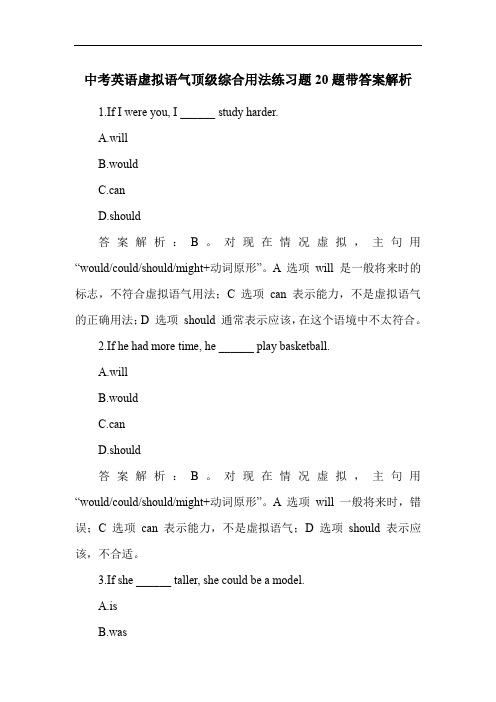
中考英语虚拟语气顶级综合用法练习题20题带答案解析1.If I were you, I ______ study harder.A.willB.wouldC.canD.should答案解析:B。
对现在情况虚拟,主句用“would/could/should/might+动词原形”。
A 选项will 是一般将来时的标志,不符合虚拟语气用法;C 选项can 表示能力,不是虚拟语气的正确用法;D 选项should 通常表示应该,在这个语境中不太符合。
2.If he had more time, he ______ play basketball.A.willB.wouldC.canD.should答案解析:B。
对现在情况虚拟,主句用“would/could/should/might+动词原形”。
A 选项will 一般将来时,错误;C 选项can 表示能力,不是虚拟语气;D 选项should 表示应该,不合适。
3.If she ______ taller, she could be a model.A.isB.wasC.wereD.are答案解析:C。
对现在情况虚拟,从句中be 动词一律用were。
A 选项is 和D 选项are 是一般现在时;B 选项was 不符合虚拟语气对现在情况虚拟中be 动词的用法。
4.If I had a million dollars, I ______ buy a big house.A.willB.wouldC.canD.should答案解析:B。
对现在情况虚拟,主句“would/could/should/might+动词原形”。
A 选项will 错误;C 选项can 不是虚拟语气用法;D 选项should 表示应该,不太符合语境。
5.If they ______ more careful, they wouldn't make so many mistakes.A.areB.wereC.isD.was答案解析:B。
英语虚拟语气习题集(带讲解和答案)

英语虚拟语气习题集1. If I ______ a millionaire, I would travel around the world.A. wasB. wereC. will beD. would be2. I wish I ______ taller so that I could play basketball professionally.A. amB. wasC. wereD. will be3. If only he ______ harder, he might have passed the exam.A. studiesB. studiedC. had studiedD. would have studied4. She acts as if she ______ the queen of the world.A. isB. wasC. wereD. would be5. I would buy that car if I ______ enough money.A. haveB. hadC. will haveD. would have6. If I ______ you, I would start looking for a new job.A. amB. wasC. wereD. would be7. He talks as though he ______ a professor.A. isB. wasC. wereD. would be8. I wish I ______ more time to spend with my family.A. haveB. hadC. will haveD. would have9. If they ______ harder, they could have won the game.A. triedB. tryC. had triedD. would try10. She would feel better if she ______ some rest.A. getsB. gotC. will getD. would get11. If I ______ the chance, I would move to a different country.A. haveB. hadC. will haveD. would have12. I wish I ______ better at public speaking.A. amB. wasC. wereD. would be13. If he ______ harder, he could have achieved his goals.A. workedB. worksC. had workedD. would work14. She acts as if she ______ the only person in the room.A. isB. wasC. wereD. would be15. If I ______ you, I wouldn't trust that person.B. wasC. wereD. would be16. I wish I ______ a better understanding of quantum physics.A. haveB. hadC. will haveD. would have17. If they ______ more time, they could finish the project earlier.A. hadB. haveC. will haveD. would have18. She would be happier if she ______ a job she enjoyed.A. hasB. hadC. will haveD. would have19. If I ______ a million dollars, I would invest in real estate.A. winB. wonC. had wonD. would win20. I wish I ______ better at time management.A. amB. wasC. wereD. would be21. If he ______ the directions carefully, he wouldn't have gotten lost.A. followedB. followsC. had followedD. would follow22. She acts as though she ______ the boss.A. isB. wasD. would be23. If I ______ you, I would take a different approach.A. amB. wasC. wereD. would be24. I wish I ______ a better understanding of advanced mathematics.A. haveB. hadC. will haveD. would have25. If they ______ harder, they could have achieved better results.A. triedB. tryC. had triedD. would try26. She would be more successful if she ______ better time management skills.A. hasB. hadC. will haveD. would have27. If I ______ enough money, I would start my own business.A. haveB. hadC. will haveD. would have28. I wish I ______ better at playing the guitar.A. amB. wasC. wereD. would be29. If he ______ more practice, he could have become a professional athlete.A. hadB. hasC. will haveD. would have30. She acts as if she ______ the most important person in the room.A. isB. wasC. wereD. would be31. If I ______ you, I would take a vacation.A. amB. wasC. wereD. would be32. I wish I ______ a better understanding of foreign languages.A. haveB. hadC. will haveD. would have33. If they ______ more effort, they could have achieved their goals.A. putB. putsC. had putD. would put34. She would be healthier if she ______ a balanced diet.A. followsB. followedC. will followD. would follow35. If I ______ a million dollars, I would donate to charity.A. winB. wonC. had wonD. would win36. I wish I ______ better at solving complex problems.A. amB. wasC. wereD. would be37. If he ______ the instructions carefully, he wouldn't have broken the machine.A. followedB. followsC. had followedD. would follow38. She acts as though she ______ the only one who knows the answer.A. isB. wasC. wereD. would be39. If I ______ you, I would reconsider my decision.A. amB. wasC. wereD. would be40. I wish I ______ a better understanding of computer programming.A. haveB. hadC. will haveD. would have41. If they ______ more time, they could have completed the project on time.A. hadB. haveC. will haveD. would have42. She would be happier if she ______ a job she loved.A. hasB. hadC. will haveD. would have43. If I ______ enough money, I would buy a house.A. haveB. hadC. will haveD. would have44. I wish I ______ better at managing stress.A. amB. wasC. wereD. would be45. If he ______ more practice, he could have become a successful musician.A. hadB. hasC. will haveD. would have46. She acts as if she ______ the only one who matters.A. isB. wasC. wereD. would be47. If I ______ you, I would seek professional advice.A. amB. wasC. wereD. would be48. I wish I ______ a better understanding of environmental issues.A. haveB. hadC. will haveD. would have49. If they ______ more effort, they could have achieved better results.A. putB. putsC. had putD. would put50. She would be more successful if she ______ better networking skills.A. hasB. hadC. will haveD. would have好的,下面是50道题的完整解答:1. B - were。
初中的解析虚拟语气的用法解析与练习
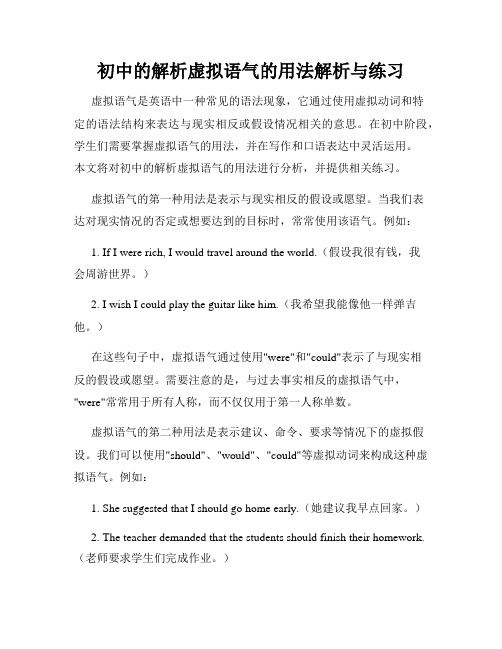
初中的解析虚拟语气的用法解析与练习虚拟语气是英语中一种常见的语法现象,它通过使用虚拟动词和特定的语法结构来表达与现实相反或假设情况相关的意思。
在初中阶段,学生们需要掌握虚拟语气的用法,并在写作和口语表达中灵活运用。
本文将对初中的解析虚拟语气的用法进行分析,并提供相关练习。
虚拟语气的第一种用法是表示与现实相反的假设或愿望。
当我们表达对现实情况的否定或想要达到的目标时,常常使用该语气。
例如:1. If I were rich, I would travel around the world.(假设我很有钱,我会周游世界。
)2. I wish I could play the guitar like him.(我希望我能像他一样弹吉他。
)在这些句子中,虚拟语气通过使用"were"和"could"表示了与现实相反的假设或愿望。
需要注意的是,与过去事实相反的虚拟语气中,"were"常常用于所有人称,而不仅仅用于第一人称单数。
虚拟语气的第二种用法是表示建议、命令、要求等情况下的虚拟假设。
我们可以使用"should"、"would"、"could"等虚拟动词来构成这种虚拟语气。
例如:1. She suggested that I should go home early.(她建议我早点回家。
)2. The teacher demanded that the students should finish their homework.(老师要求学生们完成作业。
)在这些句子中,"should"和虚拟动词完全可以省略,但是在虚拟语气中的使用可以更准确地表达说话者的意图和对他人的期望。
虚拟语气的第三种用法是表示对现在或将来的不可能实现的虚拟情况。
例如:1. If I had a time machine, I would visit the ancient civilization.(如果我有一台时间机器,我就会去参观古代文明。
- 1、下载文档前请自行甄别文档内容的完整性,平台不提供额外的编辑、内容补充、找答案等附加服务。
- 2、"仅部分预览"的文档,不可在线预览部分如存在完整性等问题,可反馈申请退款(可完整预览的文档不适用该条件!)。
- 3、如文档侵犯您的权益,请联系客服反馈,我们会尽快为您处理(人工客服工作时间:9:00-18:30)。
初中英语虚拟语气讲解及练习英语中的语气分为陈述语气、祈使语气、虚拟语气三类。
虚拟语气表示说话人的主观愿望或假想,所说的是一个条件,不一定是事实,或与事实相反。
条件句可分为两类,一类为真实条件句,一类为非真实条件句。
非真实条件句表示的是假设的或实际可能性不大的情况,故采用虚拟语气。
如果假设的情况可能发生,是真实条件句,这种情况下谓语用陈述语气。
如:If time permits, we'll go fishing together.如果时间允许,我们就一起去钓鱼。
如果假设的情况是不存在的或不大可能发生的,则是虚拟条件句。
如:If you had come yesterday, you would have met that famous professor.如果你昨天来,你就会见到那位著名的教授了。
虚拟语气的基本形式和用法在含有虚拟条件句的复合句中,主从句的谓语都要用虚拟语气。
I. 含有条件状语从句的复合句If I were you, I would give up drinking immediately.If I were to see her tomorrow, I would tell her the truth.If you went there next time, you would see what I mean.country.注意事项:1.倒装句。
如果条件句中含有功能词had,should,were时,可以省去If,把功能词提前,构成倒装句。
2.错综条件句。
若条件句和主句动作不存在同一个时间,则谓语形式应根据具体情况而定。
If he had followed the doctor’s advice, he would be quite all right now.If I were you, I would have gone home.3.If there weren't/had not been +…=without…4.If it were not for…/ If it hadn't been for…= but for…5.otherwise+虚拟语气的句子II. 虚拟语气用在宾语从句中sb. did …(希望现在用过去式)1. wish+that sb. had done…(希望过去用过去完成式)sb. would/should do(希望将来用过去将来)2. would rather后的从句要用虚拟语气。
虚拟现在 were, did (动词一般过去式)虚拟过去 had done虚拟将来 did (动词一般过去式)例:I would rather I hadn’t said such unkind things to you. (虚拟过去)I'd rather you came here for the answer tomorrow morning. (虚拟将来)I’d rather you posted the letter right away. (虚拟现在)3. suggest+(that)S+should+do…表示愿望、建议、请求等主观意向的动词之后的宾语从句,谓语用should +动词原形,should常常省略。
这类词有:decide,demand,desire,insist,order,propose,suggest,recommend,requested, require等。
注意:1. suggest 当“建议”讲时,其宾语从句用虚拟语气;当“暗示、表明”时,用陈述语气2. insist 当坚持“看法或建议”时,宾语从句用虚拟语气;当坚持“某个事实”时,用陈述语气。
判断改错:(错) Your pale face suggests that you(should)be ill.(对) Your pale face suggests that you are ill.(错) I insisted that you(should)be wrong.(对) I insisted that you were wrong.III. 虚拟语气用在主语从句It is demanded / necessary / a pity + that…等结构的主语从句,谓语动词用should 加动词原形,should 可省略。
It is后可用的词有三类:suggested, ordered, required, proposed, demanded, requested, insisted等important, necessary, natural, imperative, strange等a pity, a shame, no wonder等IV.虚拟语气用在同位语从句中。
某些表示建议、请求、命令等主观意向的名词后同位语从句需用虚拟语气,其表达形式为(should) +动词原形。
这类名词常见的有:advice,suggestion,proposal(提议),order, demand,desire,request,requirement,recommendation(推荐),plan,resolution(决议), idea 等。
eg. We are all for your proposal that the discussion ( should )be put off.V.虚拟语气用在表语从句中。
某些表示建议、请求、命令等主观意向的名词作主语时,表语从句需用虚拟语气,其表达形式为(should) +动词原形。
这类名词常见的有:advice,suggestion,proposal,order, demand,desire,request,requirement,recommendation以及plan,idea,resolution等。
eg. My suggestion is that the mayor (should)present the prizes.VI.虚拟语气用在定语从句中It is(about /high)time +that sb.did sth/should do sth..eg. Don't you think it's about time we went home?注:在this is the first time /second time that...句型中,从句中谓语动词用陈述语气完成时态。
eg.Is this the first time that you have visited Hongkong?VII. 虚拟语气用在让步、方式、目的状语从句中1.在带有even if/ even though引导的让步状语从句的主从复合句中,主句和从句都用虚拟语气,动词形式与含有非真实条件句的虚拟语气相同。
如: Even if he had been ill, he would have gone to his office. 即使生了病,他俩去办公室。
2.由as if或as though引导的状语从句表示比较或方式时。
从句谓语形式为动词的过去式(be用were)或“had十过去分词”。
如: He treated me as if I were a stranger. 他那样对待我,好像我是陌生人似的。
She talked about the film as if she had really seen it. 她谈论那部影片,就好像她确实看过一样。
3.虚拟语气用在lest(唯恐、免得),for fear that及in case引导的目的状语从句中。
在由lest等引导的目的状语从句中需用虚拟语气,表示“以防,以免”等意思,其谓语动词多由should +动词原形构成,should也可省略。
eg. He was punished lest he should make the same mistake again.VIII.虚拟语气用情感语言中1.虚拟语气在表示客气、遗憾以及祝愿等场合中,使用虚拟语气。
eg.You shouldn't have been following him so closely;you should have kept your distance.2.If only sb./sth. +时态后退型的谓语eg. If only I had known the result of the examination.虚拟语气练习(1). If I you, I would go by plane. Flying is much faster.A. beB. wasC. wereD. am(2). I do not think those people are really English. If they were, they speak withFrench accents.A. don'tB. will notC. mustn'tD. wouldn't(3) today, would we be able to get there by Tuesday?A. Were we leavingB. If we leaveC. Would we leaveD. Were we to leave(4). If Jone tomorrow, what would you do?A. were not to comeB. will not comeC. would not comeD. had not come(5). “She didn't ask me, so I didn't help her?”“You mean to say, you would've helped her ?”A. if she asked youB. if she were to ask youC.had she asked youD. were she to ask you(6). They took the injured straight to the hospital. Otherwise some of them .A. might have diedB. might dieC. would dieD. could die(7). If they had known him, to him?A. would they have talkedB. would they talkC.had they talkedD. they would talk(8). If I lived in the city, I traveal in croweded buses, but I to see lots of films.A. shall have to/shall be ableB. shall have to/am ableC. would have to/were ableD. would have to/would be able(9). I would have gone to the concert, if I time.A. had hadB. have hadC. hadD. would have had(10). I know it, I would have told you.A. HaveB. IfC. HadD. Having(11). your help, I would not have succeeded.A. BecauseB. Because ofC. ButD. But for(12). “What did Mr Smith say about his career?”“Only that if he a millionaire, he would have fewe r worries.”A. did not becomeB. had not becomeC. does not becomeD. has not become(13). “Why didn't you help him?”“I would have I didn't have the money.”A. stillB. butC. otherwiseD. or(14). “Who should go to see Li Ying? He is ill today.”“I suggest Wang Hong.”A. goesB. would goC. goD. went(15). The housemaster was strict. He requested that we television on week nights.A. not watchB. must not to watchC. not be watchingD. have not watch(16). I can't speak Japanese, but I do wish I . A. can B. could C. hadD. speak(17). “Are you enjoying your stay here?’“Yes, very much. I wish I have to leave so soon.”A. won'tB. don'tC. mustn'tD. didn't(18). “What will you do during the summer holidays?”“I don't know, but it's about time on something.”A. I'm decidingB. I'll decideC. I decidedD. I'd decided(19). I'd rather you anything about it for the time being.A. sayB. didn't sayC. don't sayD. not say(20). “Why do you have to be there at six?” “The teacher demands that everyonein his seat at six.”A. would beB. can beC. beD. will be(21). He makes a note of the assignment lest he it.A. forgetsB. forgetC. will forgetD. will not forget(22). “how does the librarian act?”“He acts as if he a walking dictionary.”A. wereB. beC. isD. has been(23). There is a law that drunken drivers severely punished.A. wereB. areC. beD. will be(24). I wish you interrupt when I'm talking on the phone.A. will notB. would notC. do notD. did not(25). Henry talks to his dog as if it him.A. understandsB. understoodC. understandD. would understand(26). Jeff looked as if he a ghost.A. sawB. has seenC. had seenD. would see(27). Give her my best regards, .A. should you see her todayB. if you saw her todayC. if you would see her todayD. should you have seen her today(28). There was a suggestion by the teachers that the meeting postponed for a week.A. had beenB. would beC. wasD. should be(29). It is highly desirable that every effort to reduce pollution in Bei jing.A. was madeB. be madeC. will be madeD. would be made(30). The manager would rather that his wife work in the same office as he dose.A. does notB. did notC. would notD. will not(31). The teacher insisted that we all back by two o'clock.A. beB. to beC. would beD. shall be(32). I didn't go to the football match, but I do wish I there.A. wentB. wasC. wereD.had been(33). It is high time we drug trafficking.(贩毒)A. did away withB. do away withC. did awayD. should do away with参考答案(1)C (2) D (3) D (4) A (5) C (6) A (7) A (8) D (9) A (10) C (11) D (12) B (13) B (14) C (15) A (16) B (17) D (18) C (19) B (20) C (21) B (22) A (23) C (24) B (25) B (26) C (27) A (28) D (29) B (30) B (31) A (32) D (33) A。
